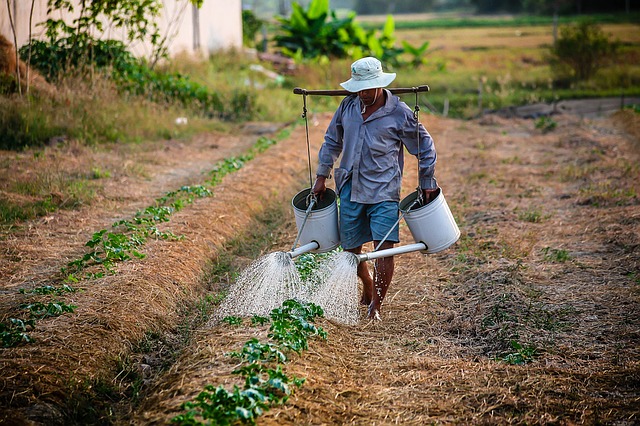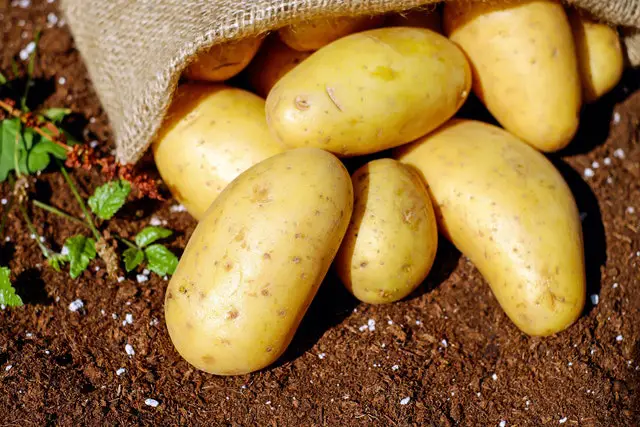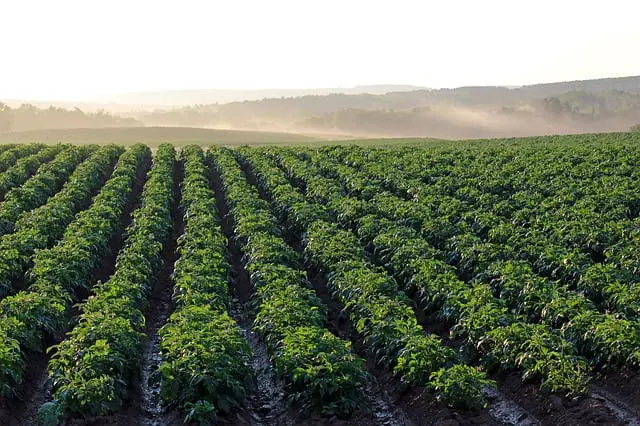Survivalist gardeners find growing potatoes to be a thrilling adventure. One of the first things you notice is the tiny sprouts breaking away from their mother tuber. Then, in a net, you watch your small plants emerge into the great outdoors after being put out on their own.
A large, bushy green plant atop the soil hides abundant resources. Unfortunately, the exact thing that makes harvesting, so fun also makes it a little challenging to figure out when to dig up those tasty tubers. Not to mention watering potatoes optimally is critical to harvesting good quality and quantities of these nutritious crops.
To know more about when to stop watering potatoes and other fascinating tips on potato planting, keep reading this post.
When To Stop Watering Potatoes?

During the flowering stage, you should not stop watering your potato plants. It is essential to time the cessation of watering correctly to avoid a poor potato harvest. If you grow potatoes in raised beds or above ground, you will have to increase your watering to ensure a decent yield.
When you plan on growing potatoes, you must first know that they require a lot of water. It is best to use loose, well-draining soil. A weekly watering of one inch is also necessary for your crops. It is assumed that no rain will fall during this time.
If you are inconsistent in doing this, you will have irregularly sized potatoes. Potato plants produce a variety of yields depending on the cultivar, but in general, you should get five to six larger potatoes per plant, along with a few smaller ones.
Although weak plants may be caused by potato diseases or pest infestations, when your plants fall over, it usually means they are entering the harvesting phase of their life cycle. Plants that have reached maturity will have yellow or brown leaves, shriveled stems, and no longer support themselves.
It Is Important To Dry Potatoes At The End Of The Growing Season
Plan for a dry harvest as you prepare to harvest potatoes during the last stages of the potato season. You don’t want the earth or potatoes wet as you dig or pull up the potatoes.
Water becomes less critical as tuber production slows since the plant prepares to die anyway. Your potatoes will not suffer any damage if you remove the water at the right time. By providing your potato plants with a moist soil environment, you prevent potential fungal infections from taking hold of your plants and your tubers.
Is It Possible To Stop Watering While Plants Are In Bloom?
During the flowering stage of your potato plants, you should not stop watering them. Therefore, you should time the cessation of watering to avoid poor potato harvests.
Potatoes grown in above-ground or raised beds need to be watered more often to ensure they will produce a good harvest.
During the period between flowering and plant dieback, potato tubers undergo rapid growth; this is when the plants are at their largest, storing the most energy from their foliage. At this stage, water is more vital than ever since water is a significant component of potato tubers.
See a related post: How Many Potatoes Grow From One Plant?
If You Continue To Give Water, What Happens?

SAS the potatoes are being flooded with water; they are more vulnerable to diseases caused by the water. If you still give your crop’s water while they are in their final stages, the excess will flood them. As soon as one day passes, excess water can negatively impact potatoes.
The potatoes will rot before you have a chance to harvest them if the water touches them. A second thing to remember is that water may be a breeding ground for molds, bacteria, and other diseases that could damage your crops.
Potatoes: How Often Should They Be Watered
Plants grow more extensive and robust when given more water (and nutrients). Immediately after you stop watering a plant, the plant begins to realize that the season is ending and focuses on producing fruit instead of growing new foliage. You will encourage them to ripen sooner by stopping watering your tomato plants.
When the plants begin to wither and change color, stop watering the plants and avoid exposing potatoes to extra water. It typically takes one to two weeks for the potatoes to cure. Allow some fresh air to enter the bed during the final week of curing by covering it with a breathable, waterproof tarp.
Summary
Thus, when to stop watering potatoes? It is essential to keep your potatoes’ growth and maturity in mind when determining how much water they need. When there is a water shortage, potatoes generally do not die quickly. When there is an excess of water, however, potatoes can suffer.
Frequently Asked Questions
Should potatoes be watered for a long time?
Watering every four to five days is sufficient during the first few weeks after planting. Water the plants every day or two during the next six to eight weeks. When they produce underground potatoes, this is the time to water. The potatoes will grow more rapidly and consistently if they are watered this way.
Are potatoes supposed to be watered every day?
When growing potatoes, the soil needs to be moist at all times. Provide your plants with 1 to 2 inches of water per week so that their soil is always damp. If your potato bed isn’t predominantly sandy loam, then two thorough soaks per week should suffice.
Is it necessary to water potatoes before they sprout?
When established, potato plants do not require watering. A significant amount of moisture will be trapped within the soil as the earthing-up process raises the soil level. The roots should search for water well below the soil’s surface, which is not a good idea.

Hey, I’m Lisa and I’ve been an avid gardener for over 30 years. I love writing, talking and living in the garden! Feel free to connect with me on my socials below

